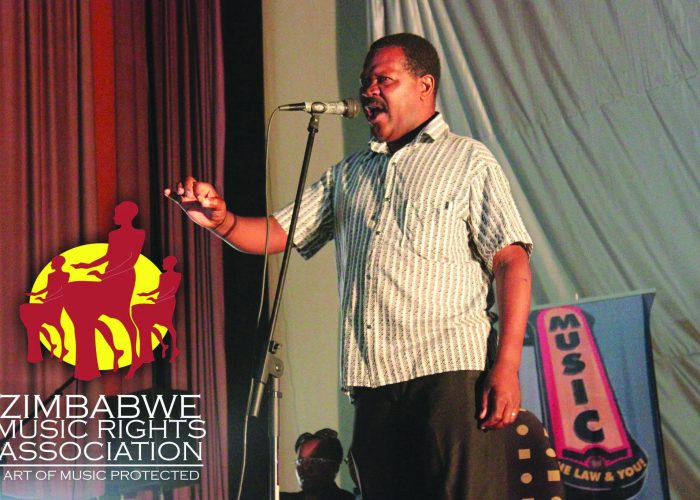


Every time you hear a song on radio, it’s money in the bank for the composers who own the rights to the song.  Or is it? Music widely played on radios, in television shows, in motion pictures, live concerts, public places is someone’s property. And when you use the music you need to have a license from the relevant authority as does the disc jockey manning your wedding feast.
Or is it? Music widely played on radios, in television shows, in motion pictures, live concerts, public places is someone’s property. And when you use the music you need to have a license from the relevant authority as does the disc jockey manning your wedding feast.
Recorded music is someone’s intellectual property that is managed by a music rights collecting body. In Zimbabwe, the Zimbabwe Musicians Rights Association, (ZIMURA) is currently the sole music royalties collecting body. The body is gearing for an elective annual general meeting which will see the Albert Nyathi- led board passing the torch to a new team that will be ushered in on December 3 at the Zimbabwe College of Music.
Six directors will be elected to the ZIMURA Council at this meeting. Candidates for nomination and subsequent election must of necessity be members. The nominations must however be made prior to the meeting and in writing on the enclosed form sent to members. The current board, whose term has expired, is made up of Albert Nyathi as chairperson, Dingumuzi Phuti, Emmanuel Thomas, Bob Nyabinde, Joyce Simeti and Witness Zhangazha. The incumbent general manager is Polisile Ncube.
ZIMURA carries a heavy mandate on their shoulders in terms of royalties collection. The organization is a vital cog in the music industry in Zimbabwe but when juxtaposed with South Africa’s SAMRO where the likes of Ray Phiri are garnering about 300 000 rands annually for a single song, ZIMURA’s efforts appear infantile. The board’s term of office has run its three-year course though, and another team is poised to assume the reins.
What did the outgoing board achieve? “Well, you can mention the property where ZIMURA is housed at 3 Aspen Court that was bought (during the outgoing board’s tenure) and the royalties’ case against ZBC which was battled and won all the way to the Supreme Court,” said Ncube in an interview. Pressing her for details. She was restrained in divulging the details of the national broadcaster’s payment record only stating that she would “offer details about that in two weeks’ time”.
How about the other broadcasters Star FM and ZiFM? “We have interdicted them from playing our music as they did not come for the negotiations. They have been playing hide and seek with us. The papers are pending at court as we speak. ZiFM were cooperating and we were about to sign the agreement but the station’s CEO Supa Mandiwanzira now current deputy minister of information resigned. They said the new chief executive needs time to study the documents first.”
I pressed the ZIMURA general manager about the issue of ring tones royalties. “That is not under our jurisdiction. The composer is supposed to license the intellectual property rights to the publisher but in Zimbabwe it is subsumed into the recording contract when an artist is recorded.
That the mechanical rights belong to the publishers is an anomaly.” What of needle time royalties? “We are aware of it, and it is supposed to benefit the performers for their performance on the recorded song but it is difficult to monitor here when we are battling with the radio stations to collect royalties.”
But how do you make sure that your records are water tight because after all, ZIMURA’S records management is the critical component in getting their members paid? “We have a board resolution to buy the US$25 000 machine that can potentially monitor 12 radio stations and televisions to make our tracking of air play more efficient but we don’t have the money in our books at present.”
At the risk of sounding simplistic, the potential for our local music industry is huge but certain administrative and structural issues need to be in place for songsmiths to realise monetary benefits. A good example is the international standard record code (ISRC) that needs to be on every recorded disc to enable tracking which is necessary for establishing the amount of air play globally. Surely this is important. Do your members know? “Yes we are aware of that but we do it internally when we assign it to members’ works.”
Do you have pension schemes for example? “We had a pension scheme with Zimnat but that was wiped out by inflation. You can’t just jump to having these schemes outside of the socio-economic context. We are living from hand to mouth as it is and so those things can only be done when the economy is doing well. We do, however, have a funeral policy though some people ask why we don’t have a medical aid scheme. But it makes sense to us to have the funeral scheme because it’s cheaper for us. We have an agreement with Cell Insurance Company for our deceased members.”
Last year both the annual general meeting and extraordinary general meeting was held in Bulawayo and attended by 53 members only out of a total of 122 members Bulawayo has. ZIMURA has more than 2000 members in Harare and Chitungwiza constitutes 90 percent of the 2527 members. It makes sense for the elective meeting to be held in Harare by sheer force of numbers. Bulawayo composers I spoke to such as Jeys Marabini and Sandra Ndebele are busy preparing to attend the elective meeting. It is worth mentioning that ZIMURA’s Bulawayo members especially since Culture Fund Trust of Zimbabwe launched an artist mobility fund to the tune of US$20 000 and according to my research only US$7 300 of that amount has been spent to date. The new board of directors needs to have people who are knowledgeable enough to steer this association through the tumultuous waters of the music industry. That one is a famous musician does not necessarily make them an astute administrator.